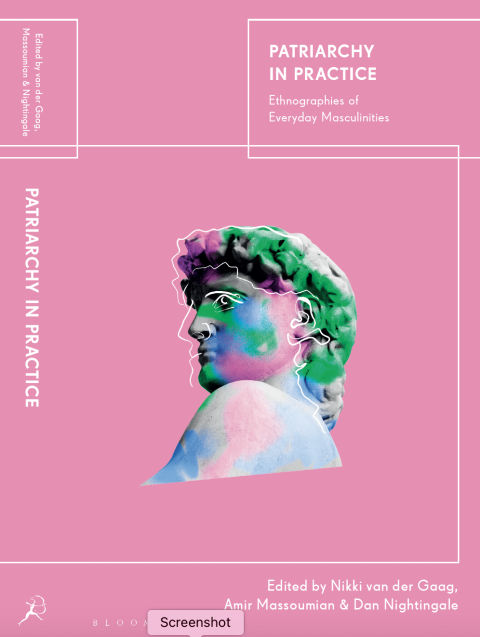
The book Patriarchy in Practice had its origins in a conference at the School of African and Oriental Studies (SOAS), in London, in 2019, which had been organised by two of its co-editors, Dan Nightingale and Amir Massoumian. The conference aimed to explore the nature of masculinities from an ethnographic perspective, and was a response to the surge in far right anti-feminist and populist narratives, embodied at the time in the election of Donald Trump to the US Presidency, as well as UK’s response to Brexit.
As the editors contacted the speakers at the conference with the idea of a book of chapters two years later, it was clear that there had been no let-up in these trends, whether this was the increasing violence by men against women around the world during the COVID-19 pandemic, or men’s continuing attempts to control women’s bodies, or the current surge in far-right politics and its evident associations with hyper-masculinity and misogyny. These phenomena remind us time and time again that patriarchy is far from dead.
Delving into how this manifests itself through ethnographic approaches gives a particular depth to the exploration of what patriarchy looks like today. This collection covers a diverse and multi-disciplinary range of topics on how masculinities is currently enacted – and how it might be re-imagined outside patriarchal power structures.
The book highlights the lived complexity of both patriarchies and masculinities as plural and situated, exploring questions of how they are constructed, negotiated and re-negotiated in daily practice; of how performative regimes interact, contradict and overlap with each other across a range of contexts.
Contributors from the UK and France, India and Indonesia, engage with theoretical frameworks engaging with feminist theory, contemporary politics of gender, bodies and marginalised experiences of masculinities. Global case studies are wide-ranging and include analysis of masculinity among communities such as drag artists, InCels and online gaming enthusiasts, as well as in the context of the body, for instance in relation to alcoholism and physical disability.
In an era of resurgence of typically hegemonic patriarchal figures in the form of ‘strong men’ leadership, this book seeks to uncover what an alternative vision of masculinity could look like - one that is firmly rooted in a gender equality and feminist discourse.
The authors are grateful to Andrea Cornwall for writing the Foreword, and to Emma Crewe and Jeff Hearn for their invaluable input. The book is divided into three sections 1. Backlash- from margins to mainstream. 2, Normativity and Diversity and 3, Bodies and Minds, and contains the following chapters:
Foreword by Andrea Cornwall
Introduction: Patriarchies in practice (Dan Nightingale, Nikki van der Gaag and Amir Massoumian)
Part 1: Backlash – From margins to mainstream
1. Alpha and nerd masculinities: Antifeminism in the digital sphere (Annie Kelly)
2. 'Before and after #MeToo': How French perpetrators of domestic violence perceive themselves as 'victims of feminism' (Cristina Oddone)
3. Phantom masculinities: Brexit, absence, and nostalgia in London pubs (Amir Massoumian)
4. Is there a 'post-patriarchal' Indian man? An ethnography of 'new' discourses of neoliberal masculinities in India (Shannon Phillip)
Part 2: Normativity and diversity
5. Tenuous masculinities: Situated agency and value of the Indonesian transgender men's masculinities (Alvi A. H. and Hendri Yulius Wijaya)
6. 'It's the touch that is doing the talking': UK sex clubs, dark rooms and the loss of masculinity (Chris Haywood)
7. Misogyny, fear or boundary maintenance? Responses to brand activism on gender diversity amongst players of Magic: The Gathering (Ceri Oeppen)
8. It takes a lot of balls to be a lady: Drag queens, masculinity and stigma (Elisa Padilla)
Part 3: Bodies and Minds
9. Sobriety, service and selfhood: Moral-existential reconfiguration of masculinity in alcoholics anonymous in a large English city (Lucy Clarke)
10 Unheard voices, untold stories; men with disabilities – The invisible victims of patriarchy, a study of Kolkata, Bengal, India (Debarati Chakraborty)
11. An interview with Ed Fornieles (Ed Fornieles, Amir Massoumian, Dan Nightingale)
12. The cultural work of hormones: The story of David and testosterone (Lauren Redfern)
Conclusion – Rupture and renewal, accountability and agency (Nikki van der Gaag, Amir Massoumian, Dan Artus)
Editors:
Nikki van der Gaag is former Director of Gender Justice and Women's Rights at Oxfam GB (2016 - 2019). She is now an independent consultant and writer who works primarily on gender, with a particular focus on girls and on masculinities. Her previous books include Feminism and Men (Zed, 2014) and the No-Nonsense Guide to Women's Rights (2008). She is the co-author of four State of the World’s Fathers reports (2015, 2017, 2019, 2021) and six State of the World’s Girls reports for Plan International.
Dan Nightingale is a Digital Anthropology PhD student at University College London, UK. His doctoral research focuses on the social politics of data, information and vaccination in Ireland and his wider interests include conspiracy theories, digital ethics, and issues around gender justice.
Amir Massoumian is a Social Anthropology PhD student at SOAS University of London, UK. His doctoral research focuses on far-right supporters in London. His topics of interest include political exclusion, nostalgia, gender, body politics, and research ethics.
Hardback | 288 pp | February 2023 | 9780755640041 | £85.00 £55.25 *Use the following discount codes to save 35% on this book when purchasing on Bloomsbury.co.uk
For ebook purchases and more details see https://www.bloomsbury.com/uk/patriarchy-in-practice-9780755640041/